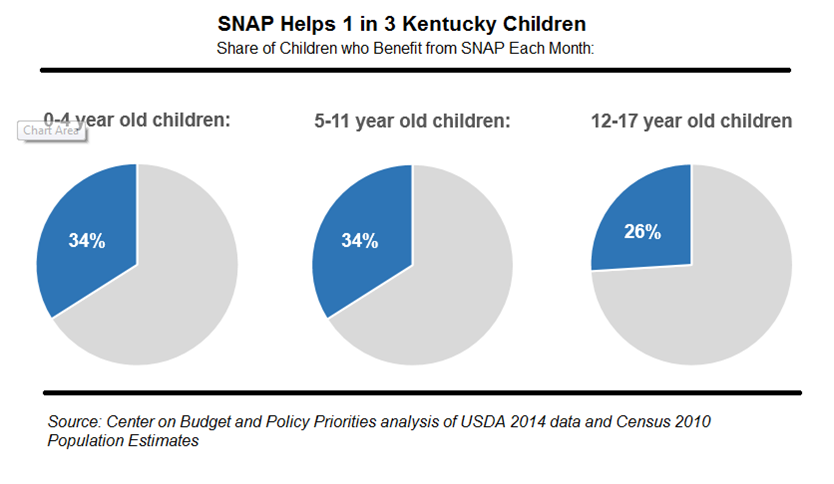The Supplemental Nutrition Assistance Program (SNAP) helps Kentucky families put food on the table. But we now know that it accomplishes much more than that.
Research increasingly shows that SNAP, formerly known as Food Stamps, can ward against the long-term effects on children of experiencing poverty, abuse or neglect, parental substance abuse or mental illness, and exposure to violence — events that can take a toll on their well-being as adults. As a new Center on Budget and Policy Priorities report finds, SNAP helps form a strong foundation of health and well-being for low-income children by lifting millions of families out of poverty, improving food security, and helping improve health and academic achievement with long-lasting consequences.
SNAP delivers more nutrition assistance to low-income children than any other program. In 2016, SNAP will help about 20 million children each month — about 1 in 4 U.S. children — while providing about $30 billion in nutrition benefits for children over the course of the year. In Kentucky, SNAP helps about 318,300 children each month, or about 1 in 3 of our state’s kids.
The amount of money SNAP provides for purchasing food is modest, but well-targeted to the families that need it the most. While participating families with children in Kentucky receive an average of $383 each month, those with incomes below 50 percent of the poverty line get $486. That’s one reason why SNAP helps lift more children out of deep poverty than any other government assistance program.
In fact, much of SNAP’s success can be attributed to its design, including a consistent national structure that effectively targets food benefits to those with the greatest need; eligibility rules and a funding structure that make benefits available to children in almost all families with little income and few resources; a design that automatically responds to changes in the economy; and rigorous requirements to ensure a high degree of program integrity.
SNAP is helping to give thousands of Kentucky children the foundation they need to succeed. After an initial boost to the program in the wake of the recession, the program has been cut back and the phase-in of rules like work requirements bring new challenges for some low-income Kentuckians even while the economy is yet to fully recover from the recession. In the future, efforts to reform or enhance it should build on its effectiveness in protecting the well-being of our children — and those nationwide — and preserve the essential program features that contribute to that success.




